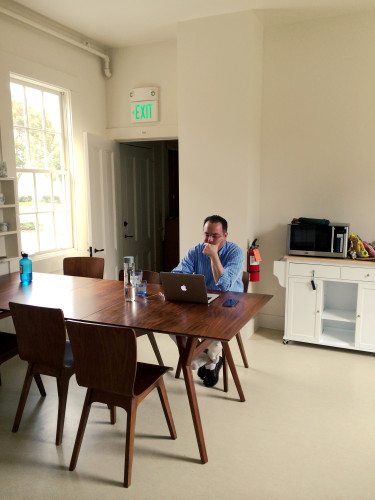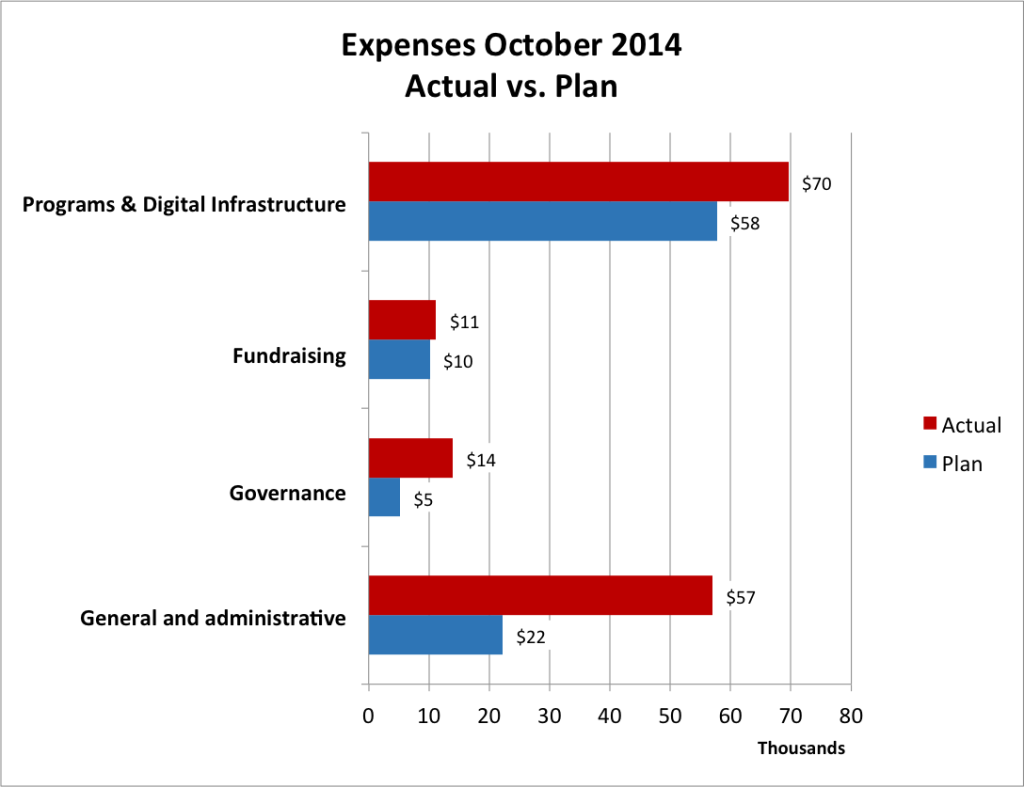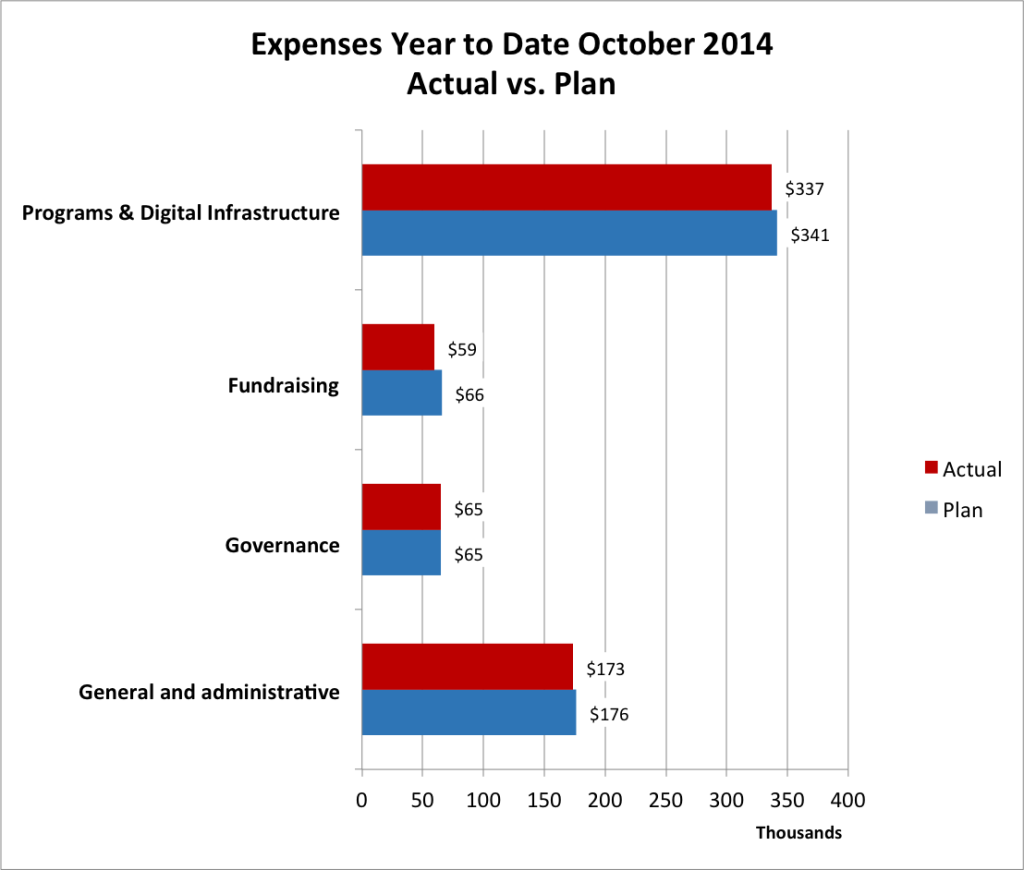1. Highlights
- The Assignment Design Wizard, our tool for streamlining and automating curriculum design for instructors, has been deployed for testing and feedback. This tool simplifies the support required for setting up new instructors or courses per term, furthering our goal of bringing more student editors into the program.
- The fall term is well underway with 95 supported courses, the highest number of participants yet.
- The Programs team has expanded once more, with the addition of two part-time Wikipedia Content Experts, Ian Ramjohn and Adam Hyland. Their role is to connect directly with students and instructors on Wikipedia, guiding them to best practices, providing direct support, and recognizing excellent work.
2. Programs
The Programs team started the month with a two-day strategy workshop for how to accomplish our goals for 2014–15. Sage Ross (who normally works remotely from Seattle) joined us in-person, and it also served as an additional orientation for Eryk Salvaggio and Helaine Blumenthal. All team members now have a good understanding of the goals for which they are accountable for, and how they will work with each other to achieve our goals.
The Programs team added two new half-time staff, Ian Ramjohn and Adam Hyland, who serve as Wikipedia Content Experts. Adam and Ian have already started reaching out to student editors to provide feedback on their work and providing Wikipedia expertise to instructors participating in the Classroom Program who ask for help.
2.1. Educational Partnerships
Jami Mathewson, our educational partnerships manager, spent the month designing a template for educational partnerships with academic organizations and university teaching and learning centers. Jami also prepared for an early November visit to Louisiana State University, in which she will present at two days of workshops on teaching with Wikipedia. She will facilitate the workshops with LSU’s Communication Across the Curriculum staff, and will determine next steps in our partnership with Louisiana State University.
2.2. Classroom Program
The fall 2014 term is well underway. Our students are hard at work posting to their sandboxes, interacting with the Wikipedia editing community on their talk pages, and moving their contributions into the article namespace. We are supporting 95 courses, exceeding our goal of 85 for the term, and the largest Wiki Ed has supported to date.
Ian Ramjohn and Adam Hyland, our newly hired Wikipedia Content Experts, are providing student editors with valuable feedback on their work and helping them to navigate the Wikipedia editing community. Ian and Adam are also helping us identify exceptional work, encouraging students to nominate their entries for Did You Know and Good Article when appropriate.
Current status of the Classroom Program (fall term 2014) in numbers, as of October 31:
- 95 Wiki Ed-supported courses have Course Pages (41 or 43% are led by returning instructors)
- 2,416 student editors are enrolled
- 679 students have successfully completed the online training.
Student work highlights:
- Two student editors had their work appear on Did You Know: Agelaia multipicta and Parischnogaster jacobsoni from Joan Strassmann’s Behavioral Ecology course at Washington University in St. Louis.
- Mlaboda from the University of Washington has created a well-drafted entry for Airlift Northwest.
- Deluminator from Kate Grillo’s African Archaeology course at the University of Wisconsin, La Crosse, has made some great contributions to the article Mumba Cave.
2.3. Communications
This month has been heavy on revising and improving our resources. We’ve made some changes to our classroom materials, updating and streamlining past brochures to make them more graphically appealing (available here), and adding information we feel students are more likely to use. We’ve started to work toward two more subject-specific handouts offering guidance on specific editing requirements within Medicine and Sociology articles, which will complement our recent handout on editing for Psychology.
Just as our office, staff and resources have been growing, so has our website. We have been developing our social media presence and blog to be more useful to instructors. This includes creating blog posts with practical advice for instructors and highlighting the resources and support we provide. Eryk Salvaggio, our Communications Associate, has been working closely with the Classroom Programs team to identify common problems to tackle in explanatory blog posts, complementing our efforts to promote ideal student work and instructors.
Blog posts:
- Welcome, Helaine and Eryk! (October 2)
- Michigan students’ science history article appears on the ‘Did You Know?’ section (October 6)
- Welcome, Renée, Ian, and Adam! (October 8)
- Monthly Report for September 2014 (October 10)
- Entering the Conversation: Wikipedia and Student Writing (October 14)
- Benefits, from Both Sides of the Assignment (October 16)
- Notes and Slides from Quarterly Reviews now available (October 20)
- Copy Right: Tips on Explaining Copyright and the Commons to Students (October 22)
- Updated Handouts Ready for Classrooms (October 29)
- Avoiding Plagiarism and Paraphrasing Problems (October 30)
News coverage:
- Lori Phillips, The New Media Consortium (Blog): ”Get to Know the Wiki Education Foundation” (October 7, 2014)
- Patrick C. Fleming, pcfleming.com (Blog): “Wikipedia Assignments: Some thoughts from mid-semester” (October 22, 2014)
2.4. Digital Infrastructure
Throughout October, Sage Ross, our Product Manager for Digital Services, has worked intensively with designers and developers to complete the “1.0” version of the Assignment Design Wizard (pictured, left), which is now up and running at wizard.wikiedu.org. This tool is the first of a series of course-focused technical projects, planned with the goals of improving the user experience for our program participants, enhancing their ability to do great work on Wikipedia, and making it easier for us to continue scaling up the number of classes we support. For the Assignment Design Wizard in particular, we want to provide a tool that an instructor can use to learn about best practices for Wikipedia assignments, choose assignment options that make sense for their course, and publish a draft course plan that can form the basis of their own custom Wikipedia assignment. If we can do that well, it should improve the quality of instructors’ assignments, reduce the time Wiki Ed staff and Wikipedia Ambassadors spend giving one-on-one assignment design guidance, and make it easier for instructors to dive into their first Wikipedia course project.
Since late October, Sage has been conducting ongoing user testing on the Assignment Design Wizard, which will continue into November. Any and all feedback is welcome, so if it sounds interesting, please give it a try and send ideas and reflections to sage@wikiedu.org.
3. Finance and Administration
3.1. Finance and Administration

Our space in the Presidio is beginning its transformation into a proper office, with the addition of desks, chairs, carpets and a couch for the lobby. Though working in a beautiful historical park has many obvious advantages, changes to the building are performed by the Presidio National Trust, which aims to preserve the historical integrity of the grounds and structures. This month, that means temporarily replacing three of our windows with plywood as the Presidio Trust adapts the building according to its rigid standards of historical preservation.
- Monthly expenses are $151,679 versus the plan of $95,185. The primary cause of the variance for the month is that the plan amount being used is from the original budget that does not include additional funding received later. A revised budget, which includes the additional funding, will be reviewed at the November board meeting.
- Year to date expenses are $634,640 versus plan of $648,230. As with the monthly variance, the primary cause is due to the use of the original budget that 1) did not include a major secondary funding source (unknown at the time); and 2) projection based on an 18-month period versus a 12-month fiscal year.
4. Office of the ED

Current priorities:
- Setting up our pilot project with high-achieving students
- Management of internal and external stakeholders
- Preparation of first in-person board meeting
In October, we completed the hiring for our upcoming pilot with high-achieving students. Samantha Erickson will join Wiki Education Foundation in mid-November to take the lead on this project. We think of high-achieving students as an attractive target group when it comes to recruiting new content contributors for Wikipedia. We also believe that there are ways of engaging students in the improvement of free knowledge outside of the classroom. That’s why we’ll embark on an experimental pilot project that will explore ways of encouraging high-achieving students to become future Wikipedians through extracurricular activities. As an organization that is devoted to ongoing learning, pilot projects like this offer a unique opportunity to try new and exciting approaches, while staying true to our focus of improving Wikipedia’s content.
Also in October, Wikipedia community members approached us and asked whether Wiki Ed would support the Wiki Conference USA in 2015. As we’ve always seen our organization as part of a wider free knowledge ecosystem, we are open to this idea in general. We also believe that in-person meetings add a lot of value to a community that is geographically dispersed and interacts mostly online. That’s why we’ve started talking to a variety of stakeholders in different parts of the U.S. and listened to their hopes and expectations around next year’s conference. This feedback will help us with deciding to which extent Wiki Ed will be able to serve the community in a supporting role when it comes to organizing Wiki Conference 2015.
5. Visitors and Guests
- Mary Graham, Harvard Kennedy School
- David Peters, EXBROOK
- Sue Gardner
- Dahlia Stein, DECA Connect
- Erik Möller, Wikimedia Foundation
- Damon Sicore, Wikimedia Foundation
- Katherine Maher, Wikimedia Foundation
- Garfield Byrd, Wikimedia Foundation
- Rebecca Handler, Pacific Foundation Services


